Search our Archives:
» Home
» History
» Holidays
» Humor
» Places
» Thought
» Opinion & Society
» Writings
» Customs
» Misc.
|
In Praise of Doing
By Michael Chessen
The Torah reading of
Pikudei, marks the close of the remarkable book of Exodus. The
initial experiences of the people of Israel vividly demonstrate the
growing pains which a nation of former slaves must undergo in order to
first achieve emotional stability and ultimately fulfill the lofty task of
serving as a moral and spiritual light unto all nations.
Several Torah readings earlier in
Exodus, prior to the divine uttering of the Ten Commandments, God needs to
repeatedly drive home to Moses the importance of warning the people
against breaking through the barriers at the base of Mt. Sinai. Although
Moses certainly understands the need to protect the people from committing
a transgression punishable by death, he seems to feel that the people's
spoken commitment to fulfill the word of God can be taken at face value.
Moses apparently does not fully realize the limitations of good intentions
in the absence of emotional stability until the sin of the Golden Calf.
Beholding the people in the aftermath of this unfortunate incident, Moses
realizes that the people were "broken loose", and needs no instructions
from God in order to literally administer the people "bitter medicine"
towards rectifying their lack of emotional and spiritual balance.
In closing Exodus, however, we find a
people who while fulfilling God's instructions to the letter, still have a
problem striking a proper balance in dedicating themselves to His service.
Whereas the materials for the construction of the Tabernacle were meant to
be donated voluntarily, the people's offerings of valuables actually came
to be something of an obsession to the point where the people had to be
"restrained" from making additional donations (Exodus 36).
Although they had been materially
excessive, Moses sees that it is fitting to bestow a spiritual blessing
upon the people's dutiful fulfillment of God's will. While this blessing
does not merit explicit mention in our Torah reading, it was recorded as
the closing verse of Psalm 90, "A Prayer for Moses". This verse, which
calls for the Divine Presence to abide in the work of our hands, greets us
in our prayer liturgy as we make our transition from the holy Sabbath to
the resumption of the six days of work. However mundane some of our
weekday tasks may sometimes seem, we should strive to see their proper
fulfillment as carrying importance commensurate to that of the work which
went into the construction of the holy Tabernacle.
Wishing you all a Shabbat Shalom !

|
|
Please let us know if you see something unsavory on the Google Ads and we will have them removed. Email us with the offensive URL (www.something.com)
|





|
